State Secretary Dr. Bärbel Kofler (BMZ) visits LIMBUA

Female power and an example of successful German-Kenyan cooperation.
The Parliamentary State Secretary to the Federal Minister for Economic Cooperation and Development (BMZ), Dr. Bärbel Kofler, visited our company in Kenya together with representatives of the BMZ, the Kreditanstalt für Wiederaufbau (KfW) and the Deutsche Gesellschaft für Internationale Zusammenarbeit (GIZ).
In her role, Dr. Kofler is committed to sustainable development and international cooperation. Her areas of focus include human rights, sustainable economic development and gender equality.
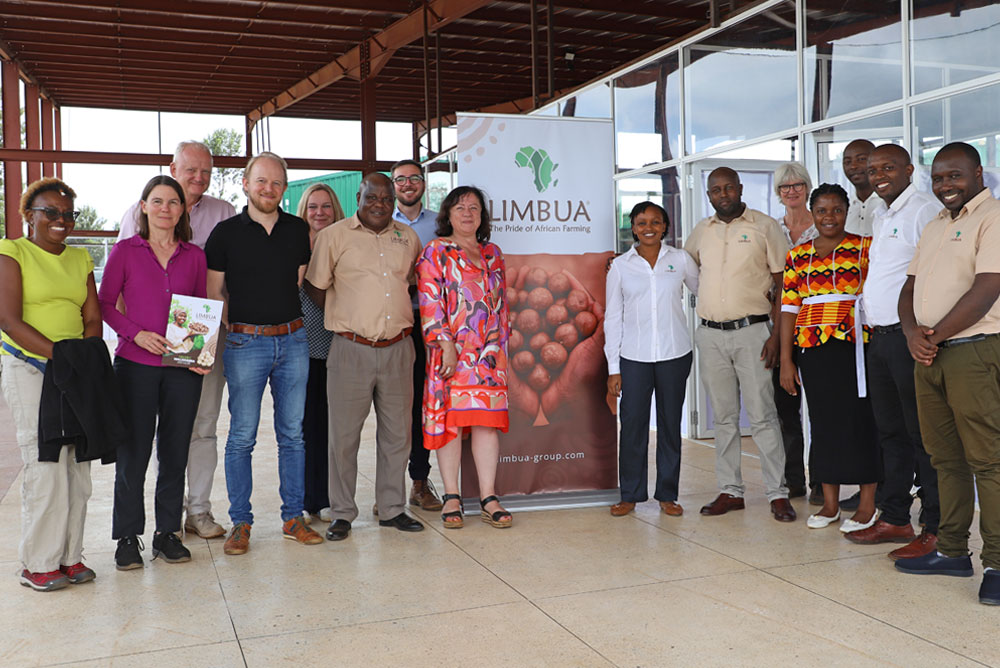
F.l.t.r.: Sheillah Karimi (KFW), Birgit Pickel (BMZ), Oskar von Maltzan (KFW), Matti Spiecker (LIMBUA Founder), Janine Barbier-Neubacher (BMZ), Peter Wangara (LIMBUA Founder), Daniel Guenther (German Embassy, Nairobi), Dr. Bärbel Kofler (BMZ), Abigael Birech, Michael Langat, Petra Jacobi (GIZ), Ruth Imbahale, Boniface Mutua, Kenneth Waweru
Development approach and best practices
- Renewable energies: The shells of the macadamia nuts as production waste are used to generate electricity and heat and thus serve as a renewable energy source. Macadamia shells are used to generate electricity in a combined heat and power plant and heat for the drying ovens.
- Job creation: LIMBUA creates numerous jobs in the rural area, especially for women, thus promoting local economic development. This also helps to reduce rural exodus.
- Organic farming and regenerative agriculture: The use of organic farming methods promotes the health of people and the environment. LIMBUA has been practising organic farming from day one.
- Modern technology: Modern German technologies are used in Kenya to ensure efficient and sustainable production processes.
- High-quality products: The fairly produced products are sold internationally in the organic food and cosmetics sector.
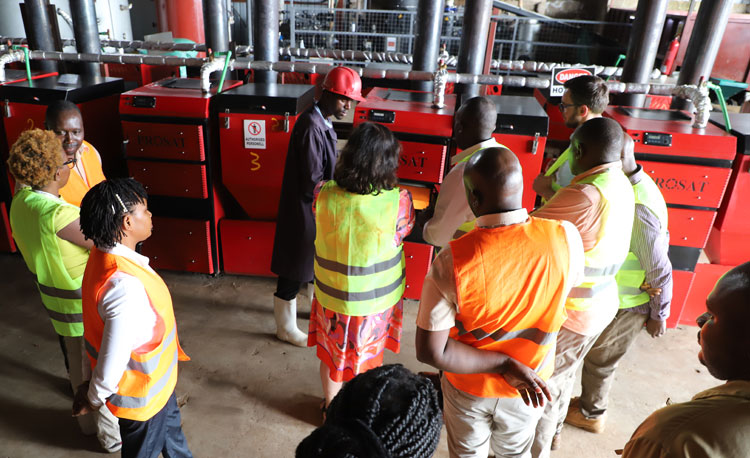
Renewable energy combined with modern technology: Macadamia shells are incinerated as production waste and converted into energy
Self-empowerment of women: A central aspect of Dr. Bärbel Kofler's work at BMZ
The State Secretary plays a key role in the empowerment of women through her work at the BMZ. Bärbel Kofler's commitment and political initiatives are aimed at improving the living conditions of women worldwide and strengthening their economic, social and political participation. She works to ensure that women's rights are firmly anchored in the international development agenda. This includes supporting programs and projects that focus specifically on the empowerment of women.
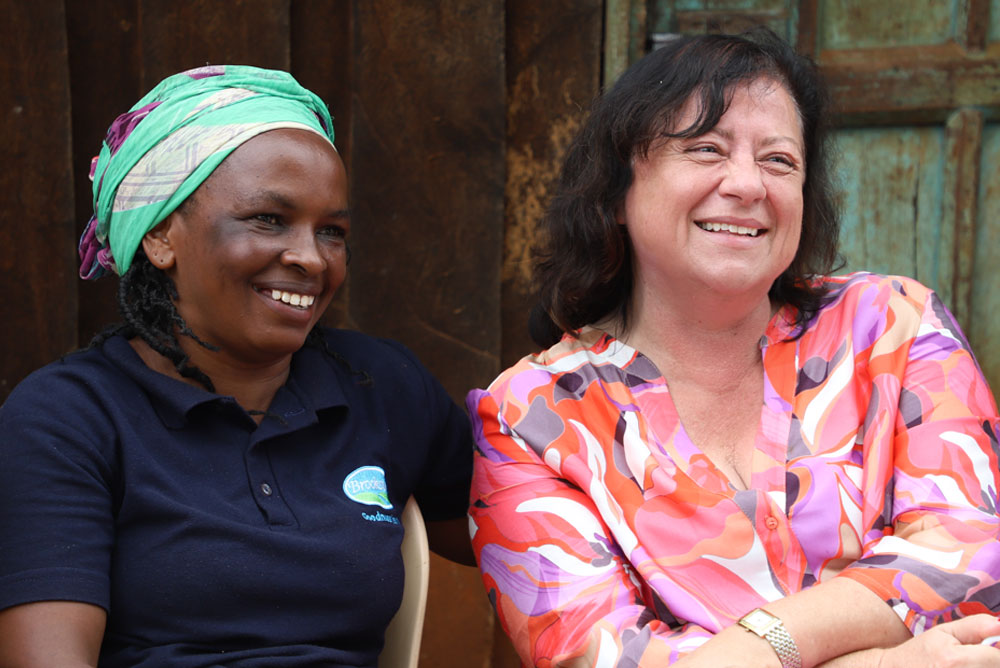
Strong women: There are many female smallholders like Niceta Muriithi (left) who are responsible for managing the farms
During her visit, Bärbel Kofler had the opportunity to get to know the LIMBUA management team. Here it became clear that we pay attention to a high proportion of women and young people when recruiting employees, including at management level.
This is because they face many challenges in rural Kenya, in particular the limited prospect of jobs and therefore financial stability.
We are implementing various measures to empower and support Kenya's rural female population:
Employment of women: Over the years, we have created numerous jobs in the production and processing of organic produce in rural Kenya. A large proportion of these jobs are specifically allocated to women. From production employees to the field teams to management level. This not only provides them with an income, but also financial independence and economic stability.
Promotion of management positions: Women are strongly represented at management level and in important decision-making processes. This not only serves as a role model for other women, but also ensures that the perspectives and needs of women are taken into account in the corporate strategy.
Education and training: LIMBUA organizes regular trainings and workshops for both smallholders and employees. These trainings cover agricultural techniques, sustainable farming methods and business management skills. Through these trainings, women can expand their skills and apply their knowledge to run their farms more efficiently.
Access to markets: Integration into the LIMBUA value chain gives women access to international markets. LIMBUA supports the farmers in selling their products at fair prices, which strengthens their economic position and offers them better earning opportunities.
A visit along the value chain
The best way to bring guests closer to the LIMBUA concept is to make it tangible. So instead of just providing information, it is important for us to give visitors in Kenya a first-hand experience of the various processes and people behind the individual steps - from the tree to the finished product.
1. It starts with the trees
The tour began with a visit to the LIMBUA tree nursery, which offers numerous benefits to the local community. It not only provides high-quality seedlings for cultivation, but also offers training and support for the farmers. This training includes modern and sustainable cultivation methods that increase yields while protecting the environment. Women in particular benefit from these programs, as they often bear the main responsibility for agricultural production.
Dr. Kofler and her companions learned a lot about the cultivation of seedlings and then planted a young macadamia tree in keeping with LIMBUA tradition. It will be a pleasure for us to have them again for a visit and let them inspect the so far grown tree.

Visit to the tree nursery
2. Meeting with smallholder Niceta Muthoni Muriithi
The farmers are the heart of LIMBUA: We source the fresh organic macadamia, avocado and mango harvests directly from them. Our visitors of course were eager to visit one of the smallholder families and gain an impression of life on an organic farm.
Because one thing is certain: An organic mixed farm is very different from the large-scale monoculture farms known from Europe and elsewhere, both in terms of cultivation methods and management. Both in terms of cultivation methods and management. In Kenya, it is often the individual farmer without a large workforce who takes care of the farm.
Niceta is no exception: She has been a LIMBUA contract farmer since 2017 and manages her farm with a wide variety of organic products as well as keeping four dairy cows, which provide an income for her and her family.
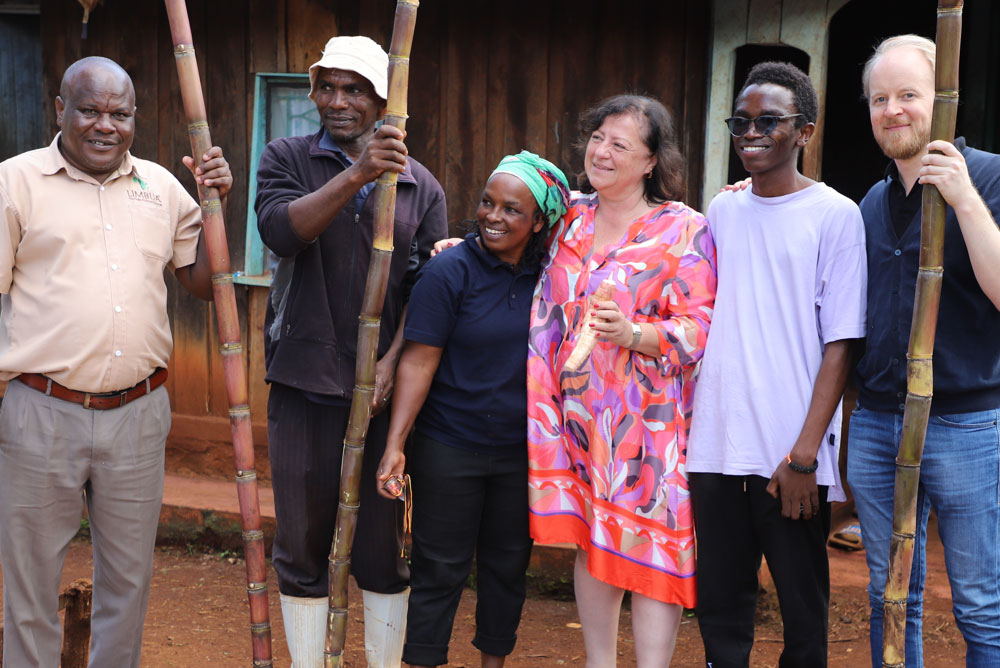
Organic sugar cane for the visitors
Profile Niceta Muthoni Muriithi:
- She has been working with LIMBUA since 2017
- Married, three adult children
- One son is studying medicine at Mount Kenya University
- The income from the cooperation with LIMBUA enables her to pay school fees and to buy an extra heifer each year
- Her organic mixed farm is about 2 acres in size
- She grows the following organic products: Macadamia, avocado, mango, potatoes, pumpkin, sugar cane and much more.
The welcome was warm and full of joy on both sides. The visitors were proudly shown around the farm and familiarized with the processes - such as removing the green outer skin of the macadamia nuts before they are collected by the purchasing teams. The green shells remain on the farm and are used as organic compost material.
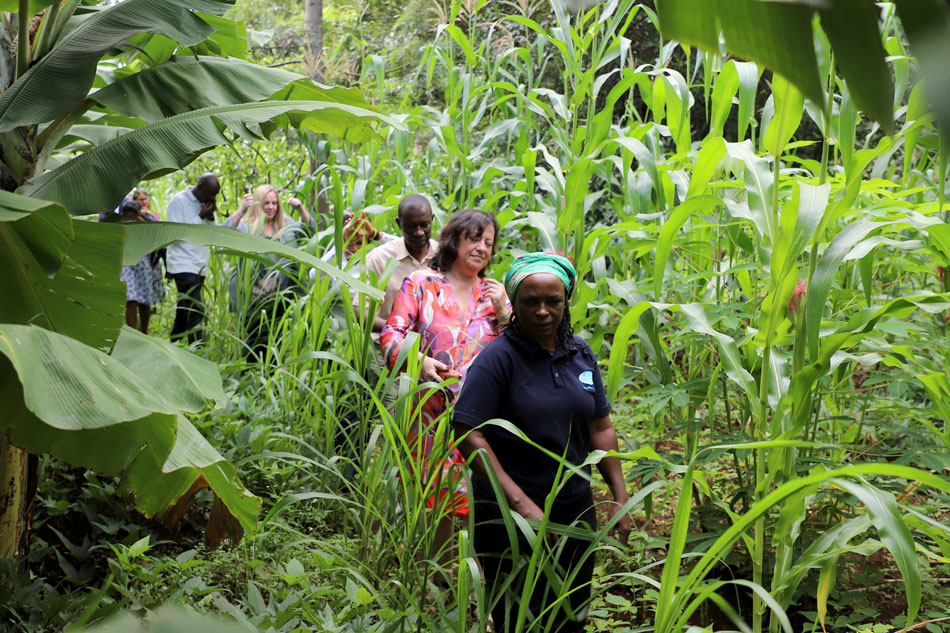
A different world: an organic mixed farm in the Kenyan highlands has almost nothing in common with monoculture farming
3. The organic mixed farm - living diversity
Niceta Muriithi's farm impressed the guests with its extraordinary diversity: a wide variety of plants grow seemingly wild and close together, forming a self-contained, mutually complementary system. Organic mixed farms such as Niceta's promote biodiversity, improve soil quality and reduce the risk of crop failure.
Of course, the magnificent mature organic macadamia trees on the farm were also admired: these play an important role within the ecosystem as they provide shade with their long leaves and protect the soil from erosion. Smallholder Niceta owns 36 macadamia trees, which grow alongside many other plant species on her farm and provide her livelihood.
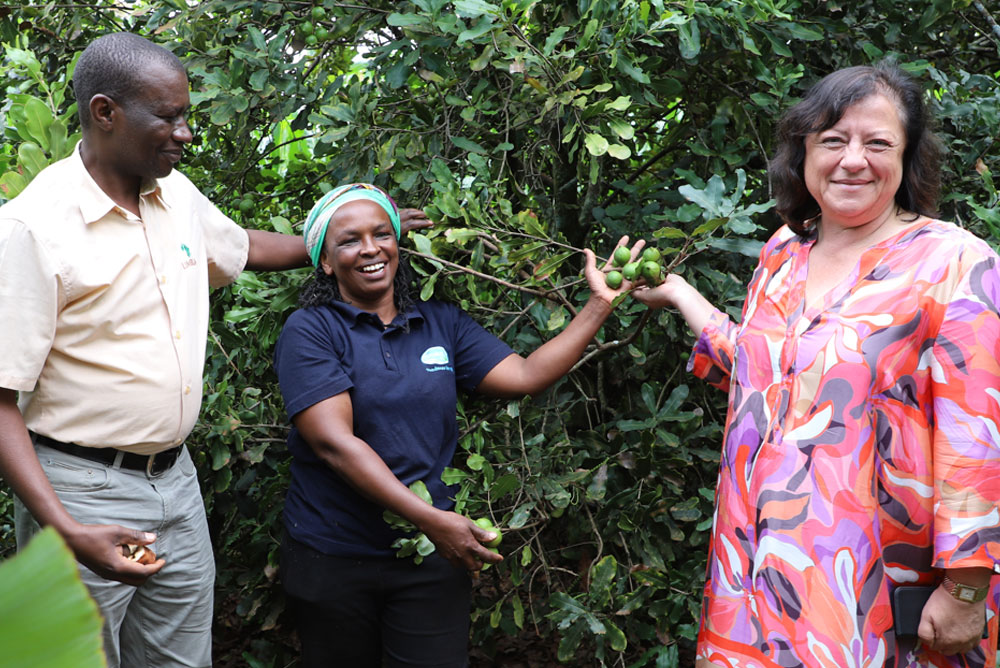
Field Manager Peterlis Musili, smallholder farmer Niceta Muriithi and Dr. Bärbel Kofler with fresh macadamia nuts on the tree
Also the purchasing process of the fresh harvest was shown to the visitors: The farmers do not have to transport the macadamias, avocados and mangoes themselves to the LIMBUA production sites. Instead, the harvest is weighed, loaded and transported by the LIMBUA purchasing teams. The whole process is digitally traceable and payment is made by cell phone.
4. Harvest processing at the production sites

Food Safety Manager Ruth Imbahale explains the process of turning organic avocados into oil
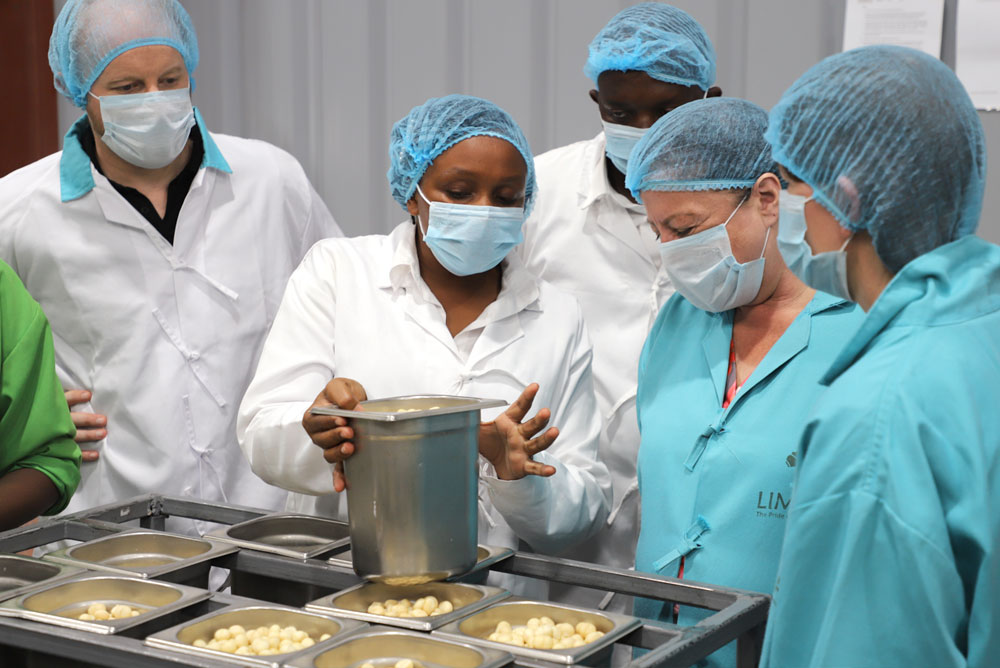
Freshly cracked macadamia nuts
Sustainable cooperation for a better future - BMZ and LIMBUA
The visit by Dr. Bärbel Kofler and her companions was a pleasure and an appreciated, inspiring exchange for all involved. Through the use of sustainable practices, modern technology and the support of the Kenyan rural population, a contribution is being made to economic and social development.
Thanks to the support of the BMZ, LIMBUA is able to show how fair and sustainable products can be created through partnership-based cooperation, benefiting both producers and consumers.
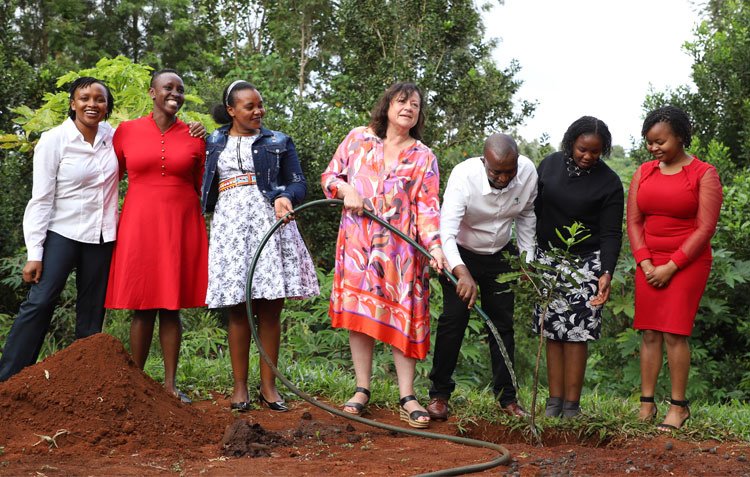
BMZ und LIMBUA. F.l.t.r.: Abigael Birech, Joyce Wamae, Peace Mutua, Dr. Bärbel Kofler, Boniface Mutua, Regina Rwamba, Bilha Wanjira

